Arizona
Giant Virgin Mary
Another oddity from my recent southern Arizona trip:About 100 miles south of Tucson, in the town of Hereford, a 31-foot-tall statue of the Virgin Mary has been erected on the side of a hill. It's so close to the border that, if you stand in the right place, you can see both the Virgin Mary statue and the border wall in the valley below.
The statue was built by Pat and Jerry Chouinard in the 1990s. It stands alongside a 75-foot-tall Celtic cross. But giant crosses seem less odd than giant Virgin Marys. (Unless the crosses are really giant, see our previous post "The largest cross in the western hemisphere").


How does this giant Virgin Mary compare to other giant Virgin Marys around the world? It's not close to being the tallest. The record goes to the Mother of All Asia statue in the Philippines which stands 322 ft high. The American record (9th tallest in the world) goes to Our Lady of the Rockies (90-feet-tall) in Butte, Montana.

source: gcatholic.org
There's a 33-foot-tall statue of Our Lady of Guadalupe in Windsor, Ohio. That may be the second-tallest in America. Assuming that Our Lady of Guadalupe is the same as the Virgin Mary. I'm not sure if place-specific Marian apparitions are considered to be equivalent to the original Mary.
That would make the Virgin Mary in Arizona the third-tallest in the United States.
More info: Roadside America
Posted By: Alex - Thu Dec 19, 2024 -
Comments (3)
Category: Religion, World Records, Statues and Monuments, Arizona
The Thing museum
Yesterday I posted about a recent visit I made to the Last Supper Museum in Douglas, Arizona. On the same trip (in fact, on the same day) I also visited "The Thing" museum, which is off the I-10, about 70 miles north of Douglas (and 50 miles east of Tucson).The two are both weird museums, but share no similarities beyond that.
The Last Supper Museum is the oddball passion project of an individual. The Thing, on the other hand, is highly commercialized and corporate-owned.
The commercialization begins with the numerous billboards advertising the museum up and down the I-10. Then, when you arrive, you find that it's part of a gas station/travel stop complex. To get to the museum itself you have to walk through a gigantic gift store.


The Thing wasn't always like that. It started out sixty years ago as a roadside attraction run by Thomas Binkley Prince. He displayed a few oddities, such as a car that he claimed had belonged to Hitler, as well as a mummified humanoid body that he called "The Thing" (the namesake of the museum).
Prince died in 1969, and the museum was eventually acquired by Bowlin Travel Centers, Inc.
In the 2010s, Bowlin expanded and updated the museum. They evidently decided to capitalize on the "Ancient Aliens" craze, because the majority of the museum is now devoted to telling the story of an extraterrestrial race, the RAH'thians, and their ongoing interaction with life on Earth, beginning with the dinosaurs and continuing through to the present day.
You walk through a winding exhibit hall, past life-size models of extraterrestrials and dinosaurs (and extraterrestrials fighting dinosaurs with laser guns). The models are pretty cool and very professionally done. The problem is that it all comes across as a bit jokey and tongue-in-cheek, which negates the weird factor.



Questions are frequently posed on the walls.


Finally you arrive at a room in which the original Thing is displayed. The connection between the Thing and the preceding dinosaurs and extraterrestrials wasn't clear to me.
It cost $5 to see the entire museum, which isn't a lot. If you happen to be driving down the I-10, I'd say go see it. But I wouldn't make a special trip to visit it.
More info: RoadsideAmerica.com; Wikipedia.

Posted By: Alex - Tue Dec 17, 2024 -
Comments (6)
Category: Aliens, Museums, Dinosaurs and Other Extinct Creatures, Arizona
The Last Supper Museum
Down in the small Arizona border town of Douglas (population 16,000), one can find the Last Supper Museum, which hosts hundreds of works of art inspired by Da Vinci's masterpiece. It's a strange location for a museum dedicated to a piece of high Renaissance art — Douglas doesn't really spring to mind as a cultural hotspot — but then it's a strange museum.Last week my wife and I spent a few days driving around southern Arizona, checking out various sights such as Chiricahua National Monument. So, since we were in the neighborhood, we decided to visit the Last Supper Museum.

Based on its name, you might think the museum would be filled with Christian devotional pieces. And the curator reports that quite a few people who visit it expect this to be the case. But instead, it's the opposite. The museum skews heavily towards the offbeat, weird, and irreverent. It's really about all the bizarro ways Da Vinci's mural has been transformed and reinterpreted by modern culture.
So, for instance, you've got versions of the Last Supper done in unusual mediums such as banana fibers, coal, shoes, tupperware, and ostrich eggs. You've got Last Suppers in which Jesus and the apostles have been replaced by characters from pop culture (a lot of Star Wars, cats, extraterrestrials, Harry Potter, etc.). You've got social commentary, such as a banned-book version of the Last Supper. And mixed in with all this, you find more traditional, devotional pieces, such as some very impressive wood carvings.

Banana Fiber Last Supper

"The Last Slipper"
And then there's the curator, Eric Braverman, who hails from the world of Heavy Metal. He spent years traveling with bands such as Slayer, Metallica, and Megadeath. Much of the funding for the museum came from a donation made by Tom Araya, bassist for Slayer. Braverman totally looks like a metalhead, and that just adds to the weird, idiosyncratic nature of the museum.
We showed up unannounced, but Braverman happily gave us a guided tour for over an hour, filling us in on the backstory of each exhibit. He's definitely a natural showman. At one point he was rolling around on the floor to illustrate a point.

Eric Braverman, Last Supper Museum curator
So, overall I'd say the museum is a must-see if you're in the area. I'd even rank it among the top-tier best weird museums I've ever been to, up there with the Museum of Jurassic Technology in Los Angeles and Marvin's Marvelous Mechanical Museum in Detroit. Although I think you really need Braverman acting as a guide to get the full experience of the Last Supper Museum.
More info: LastSupperMuseum.com; Roadside America article about the museum; Arizona Republic article.

Extraterrestrial Last Supper

Ostrich Egg Last Supper

Velvet Last Supper

"Your Last Supper"
Posted By: Alex - Mon Dec 16, 2024 -
Comments (2)
Category: Art, Museums, Arizona
The Great Grand Canyon Deer Drive of 1924
In the early 1920s, the deer population was growing out of control on the Kaibab Plateau north of the Grand Canyon. The area had been designated a National Game Preserve in 1906, and since then the deer population had swelled from around 4000 to as many as 100,000 (by some estimates).Farmer George McCormick came up with a solution. He proposed herding thousands of the deer down into the canyon, over the Colorado river, and then up onto the South Rim where there was plenty of room for them.
Critics pointed out that you can't herd deer, but this didn't deter McCormick. He put together a team of about 50 men on horseback (including the writer Zane Grey) and 100 local Native Americans on foot. Then they set out to herd the deer. Details of how they fared from Arizona Highways magazine (July 2004):
"But as they drew near the deer, instead of retreating, the animals almost invariably dashed through the cordon of men," reported the Sun. "Not only did they refuse to run away forward, but in charging the line, the animals seemed not to care a particle how close they came to the men. In many instances the latter had to give ground.
"One immense buck charged four mounted men, of whom Mr. Grey was one, and the latter reached for his gun, expecting to be run down. The deer just missed the quartet...
The effort continued through that day and the next. But it never approached anything but total chaos, with deer stampeding in every direction.
For more info, there's a detailed article about the deer drive in the Summer 2004 issue of Boatman's Quarterly Review (available as free pdf). Some images from that article:


Posted By: Alex - Thu Oct 24, 2024 -
Comments (3)
Category: Animals, Farming, Really Bad Ideas, 1920s, Arizona
Arizona Fumigation
Back in the day you had to be fumigated before they'd let you into Arizona.They've still got agricultural checkpoints on the border, but I've only ever been waved through.

Miami News - May 2, 1924
Thanks to Don Griffith!
Posted By: Alex - Thu May 09, 2024 -
Comments (1)
Category: Government, Officials, Farming, 1920s, Arizona
Miss Stacked Job
As far as I can tell, the term "stacked job" (as it was used in 1960s-era computing) was roughly equivalent to what today would be called 'batch processing'. It was a stack of jobs (or programs) to be run by the computer.When the Northern Arizona University Data Processing Club came up with the idea of awarding a young woman the title of "Miss Stacked Job," they admitted, "We didn't know how many, if any, girls would want the title." They ended up with ten contestants. Kathe Kline was the winner.
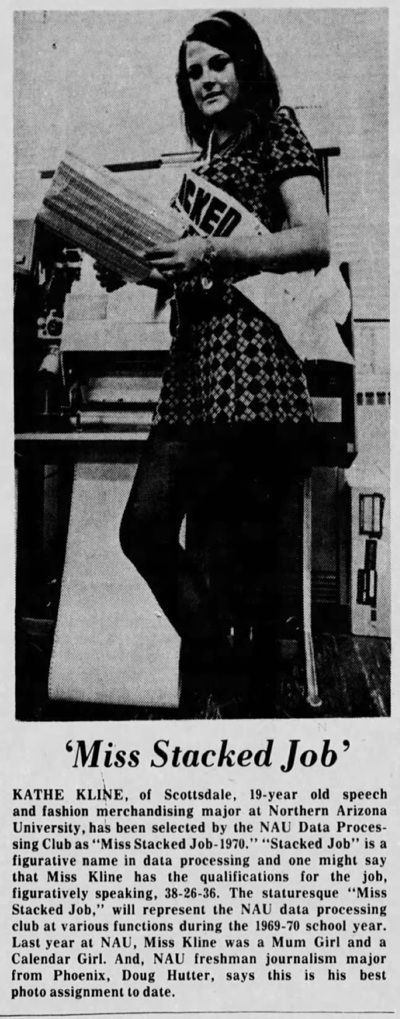
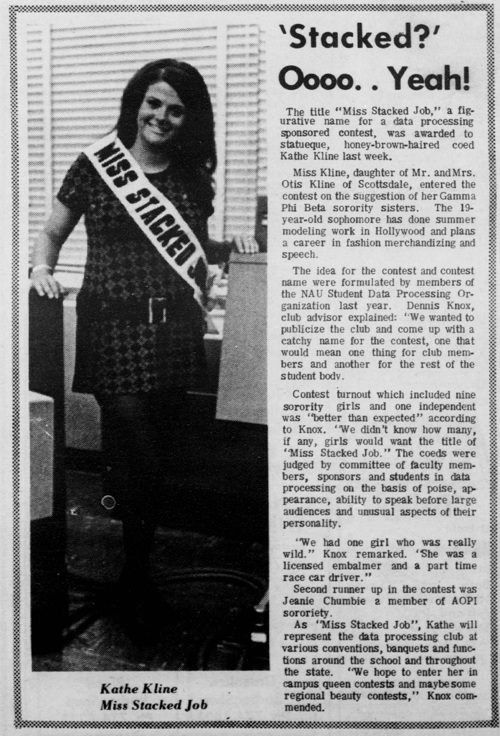
Posted By: Alex - Fri Jan 19, 2024 -
Comments (0)
Category: Awards, Prizes, Competitions and Contests, Computers, 1960s, Arizona
Show Low, AZ
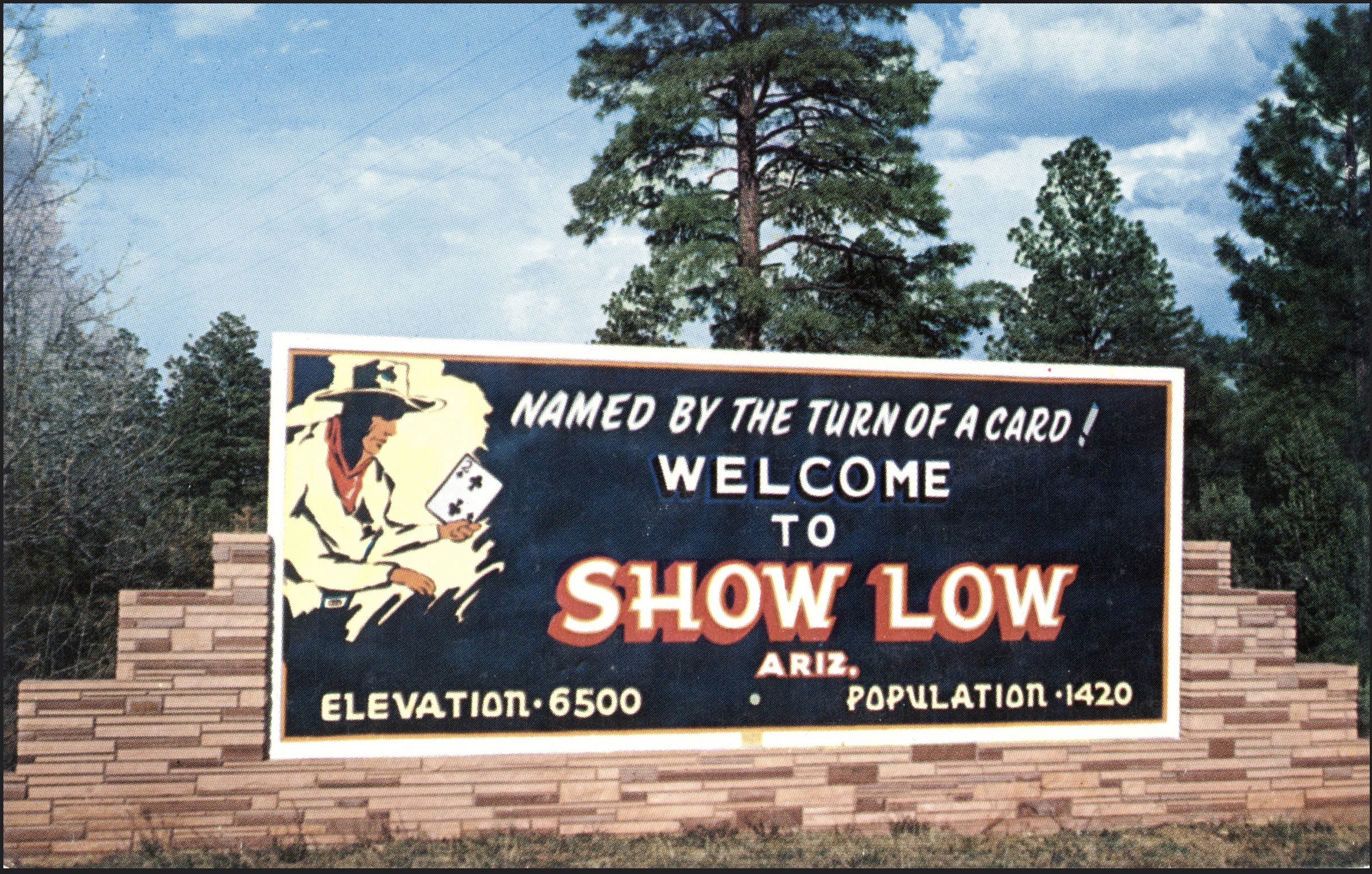
For our category of weird town names, such as Linoleumville.
The city's home page.
Their Wikipedia entry, from which we learn:
According to a legend, the city's unusual name[5] resulted from a marathon poker game between Corydon E. Cooley and Marion Clark. The two men were equal partners in a 100,000-acre (400 km2) ranch; however, the partners determined that there was not enough room for both of them in their settlement, and agreed to settle the issue over a game of "Seven Up" (with the winner taking the ranch and the loser leaving).[6] After the game seemed to have no winner in sight, Clark said, "If you can show low, you win." In response, Cooley turned up the deuce of clubs (the lowest possible card) and replied, "Show low it is."[7] As a tribute to the legend, Show Low's main street is named "Deuce of Clubs" in remembrance
Posted By: Paul - Tue Nov 07, 2023 -
Comments (1)
Category: Regionalism, Weird Names, Gambling, Casinos, Lotteries and Other Games of Chance, Nineteenth Century, Arizona
Corn Rocks
"Corn rocks" are pieces of lava rock that have impressions of pieces of corn imbedded in them. Geologists have found many samples of corn rocks around the Sunset Crater Volcano in northern Arizona. When the volcano erupted, about 1000 years ago, the people that lived around it were evidently putting pieces of corn in the lava to create these rocks. Why they did this is anyone's guess. Perhaps for religious reasons, or perhaps just for fun.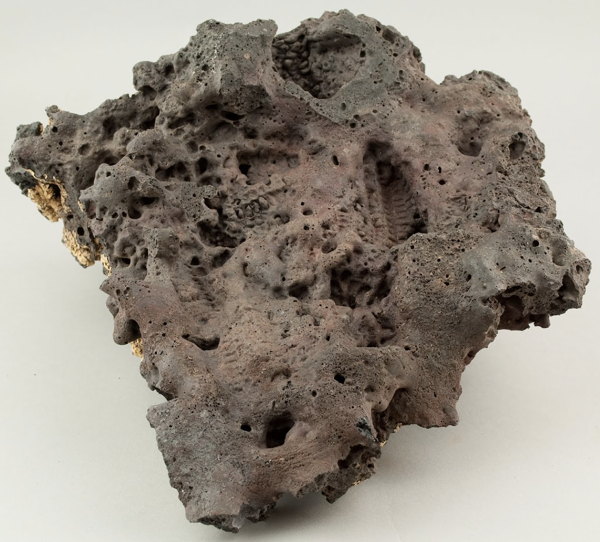
Source: Google Arts & Culture
Geologists tried to create corn rocks of their own at Kilauea Volcano in Hawaii, but they found it wasn't as straightforward as they had assumed. Putting the corn in the path of a lava flow didn't work. Nor did dropping corn on top of a flow. Geologist Wendell Duffield tells the rest of the story:
Obviously, it would not be safe for humans to carry ears of corn into the fallout zone of a towering lava fountain. A safe setting, however, would be at what geologists call an hornito (means "little oven" in Spanish). An hornito is essentially a miniature volcano that spews molten blobs of melt that fall back to Earth and accumulate into a welded-together chimney-like stack as they solidify and cool...
So, early Native Americans living near the present site of Sunset Crater Volcano witnessed an eruption that at some stage could be safely approached to place ears of corn at the base of an active hornito.
Posted By: Alex - Fri Aug 11, 2023 -
Comments (0)
Category: Nature, Science, Anthropology, Ancient Times, Arizona
Welcome To Gila Bend
I've driven through the small town of Gila Bend many times, because it's on the road between Phoenix and San Diego which I drive fairly often. But I only recently realized that it has a weird welcome sign: "Gila Bend welcomes you. Home of 1917 friendly people and 5 old crabs."The 5 old crabs are listed: Earl Carpenter, Clyde Kreeger, Scott Smith, Peggy Perry, and Pat Lauderdale.
From Wikipedia:

Posted By: Alex - Sun Mar 12, 2023 -
Comments (4)
Category: Signage, Billboards, Arizona
The woman who sued God and won
On Aug 17, 1960, Betty Penrose's house in Phoenix was hit by lightning. Nine years later she sued God for damages — and won. Kinda. Sorta. Technically, what she won was the right to summon God to a trial which (assuming God would be a no-show) would have resulted in a default judgement against the deity.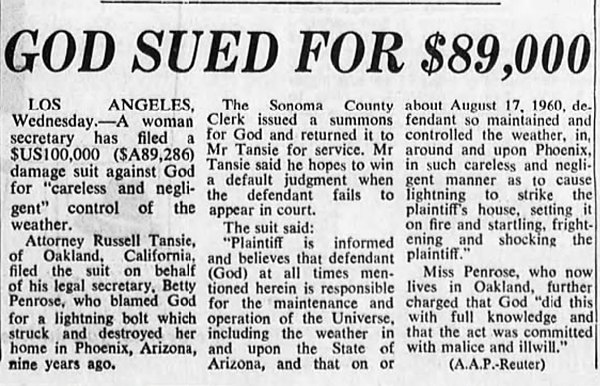
Sydney Morning Herald - May 15, 1969
Some additional context is necessary to understand Penrose's case.
Over in Sebastapol, California, singer Lou Gottlieb had been fighting the county government's attempt to shut down the hippie commune he had started on his Morning Star Ranch. As a legal maneuver to avoid paying the county's fines, Gottlieb deeded his land to God. Then he declared that the county could try collecting the fines from God.
This caused Phoenix attorney Russell Tansie, who was Penrose's employer, to realize that if God now legally owned property (the Morning Star Ranch), then God could be sued for damages. And that's how Penrose's suit emerged.
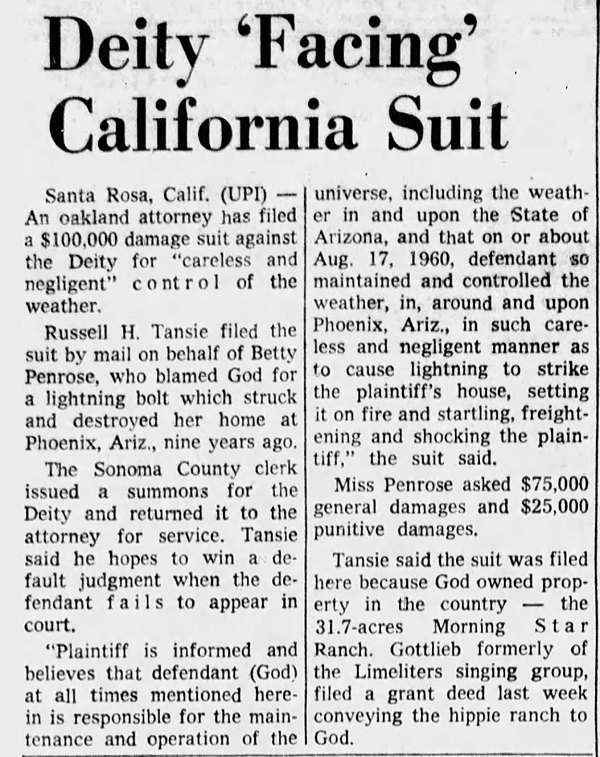
Indianapolis Star - May 14, 1969
However, I don't think Penrose's case ever made it to trial because, back in California, a judge had ruled that God, being neither a "natural or artificial person," could not legally own Gottlieb's ranch. So Gottlieb was still the owner and had to pay the fines.
And if God didn't own the ranch, then Penrose's case became moot.
But if Penrose's case had proceeded, it was possible God wouldn't have been a no-show. San Quentin prisoner Paul Yerkes Bechtel claimed to be God. So he might have appeared in court. And Joseph Njue of Kenya had also offered to defend God.
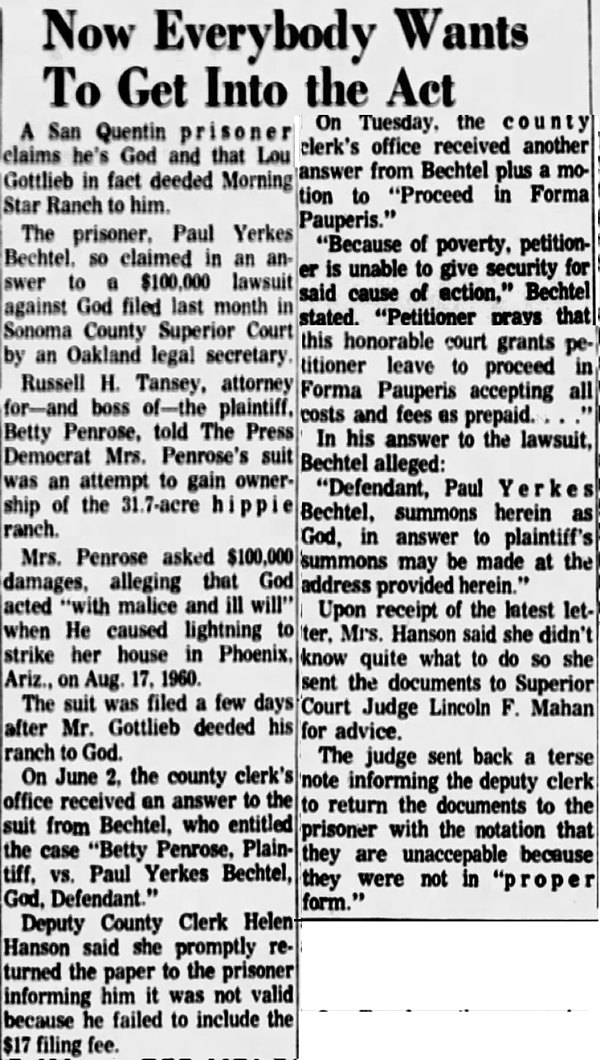
Santa Rosa Press Democrat - June 12, 1969
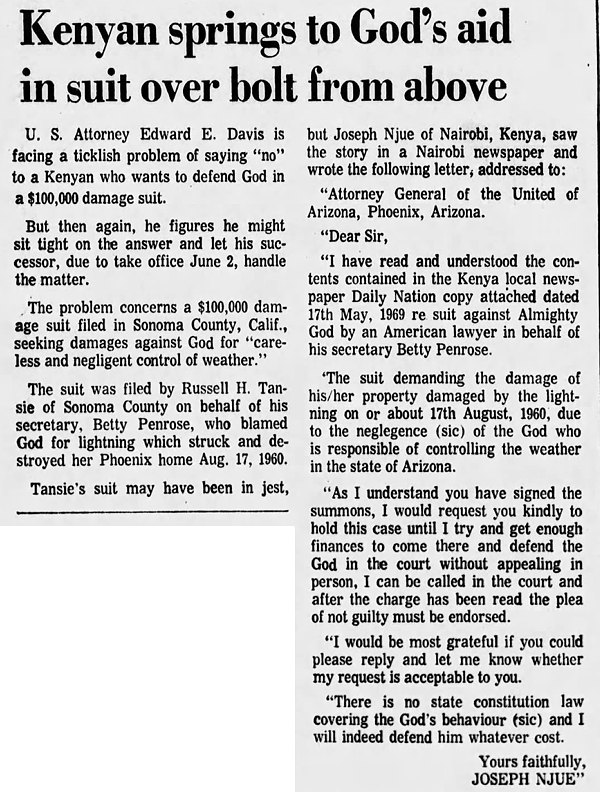
Arizona Republic - May 22, 1969
Posted By: Alex - Tue Dec 20, 2022 -
Comments (2)
Category: Religion, Lawsuits, 1960s, Arizona

| Who We Are |
|---|
| Alex Boese Alex is the creator and curator of the Museum of Hoaxes. He's also the author of various weird, non-fiction, science-themed books such as Elephants on Acid and Psychedelic Apes. Paul Di Filippo Paul has been paid to put weird ideas into fictional form for over thirty years, in his career as a noted science fiction writer. He has recently begun blogging on many curious topics with three fellow writers at The Inferior 4+1. Contact Us |




